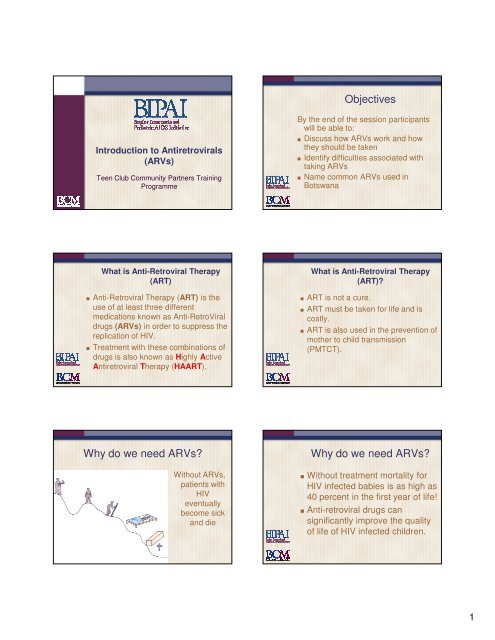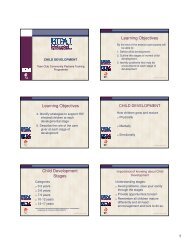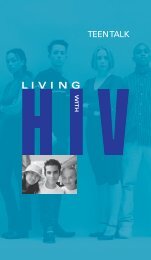Introduction to Arvs - Botswana Teen Club
Introduction to Arvs - Botswana Teen Club
Introduction to Arvs - Botswana Teen Club
Create successful ePaper yourself
Turn your PDF publications into a flip-book with our unique Google optimized e-Paper software.
<strong>Introduction</strong> <strong>to</strong> Antiretrovirals<br />
(ARVs)<br />
<strong>Teen</strong> <strong>Club</strong> Community Partners Training<br />
Programme<br />
What is Anti-Retroviral Therapy<br />
(ART)<br />
� Anti-Retroviral Therapy (ART) is the<br />
use of at least three different<br />
medications known as Anti-RetroViral<br />
drugs (ARVs) in order <strong>to</strong> suppress the<br />
replication of HIV.<br />
� Treatment with these combinations of<br />
drugs is also known as Highly Active<br />
Antiretroviral Therapy (HAART).<br />
Why do we need ARVs?<br />
Without ARVs,<br />
patients with<br />
HIV<br />
eventually<br />
become sick<br />
and die<br />
Objectives<br />
By the end of the session participants<br />
will be able <strong>to</strong>:<br />
� Discuss how ARVs work and how<br />
they should be taken<br />
� Identify difficulties associated with<br />
taking ARVs<br />
� Name common ARVs used in<br />
<strong>Botswana</strong><br />
What is Anti-Retroviral Therapy<br />
(ART)?<br />
� ART is not a cure.<br />
� ART must be taken for life and is<br />
costly.<br />
� ART is also used in the prevention of<br />
mother <strong>to</strong> child transmission<br />
(PMTCT).<br />
Why do we need ARVs?<br />
� Without treatment mortality for<br />
HIV infected babies is as high as<br />
40 percent in the first year of life!<br />
� Anti-retroviral drugs can<br />
significantly improve the quality<br />
of life of HIV infected children.<br />
1
With ARVs, People With HIV Can Live<br />
Long, Healthy Lives<br />
The child on ARVs<br />
can have a<br />
normal, healthy<br />
life<br />
How should ARVs be taken?<br />
� The patient must take three different ARV<br />
drugs. The medicines do not work well if<br />
you take only one or two.<br />
� ARVs usually work in combination because<br />
of the nature of the replication cycle of the<br />
HIV.<br />
� If the ARV that operates at a particular site<br />
of the CD4 cell fail <strong>to</strong> s<strong>to</strong>p some of the<br />
virus, the other ARVs in the combination<br />
will operate at the other sites <strong>to</strong> make the<br />
virus inactive.<br />
� Another way <strong>to</strong><br />
explain the<br />
importance of taking<br />
all three ARVs is <strong>to</strong><br />
compare the ARVs <strong>to</strong><br />
the three legs of a<br />
cooking pot.<br />
� If a pot is balancing<br />
on three s<strong>to</strong>nes and<br />
you take one away,<br />
the pot will spill.<br />
What do ARVS do?<br />
� They keep the virus<br />
from multiplying<br />
� A good way <strong>to</strong> think<br />
about how ARVs<br />
work is that they<br />
keep the virus<br />
“sleeping”<br />
How <strong>to</strong> educate caregivers and children on<br />
taking all the three drugs!<br />
Look at the soldier in the<br />
picture.<br />
He is wearing three things:<br />
a hat, a shirt and pants<br />
You can tell young patients<br />
that ARVs are like the<br />
soldier’s hat, shirt and<br />
pants. If the soldier lost his<br />
pants, it would be harder<br />
for him <strong>to</strong> work!<br />
How should ARVs be taken?<br />
HAART refers <strong>to</strong> taking three effective<br />
antiretroviral medicines <strong>to</strong>gether<br />
The classes of ARV drugs are:<br />
� Nucleoside Reverse Transcriptase<br />
Inhibi<strong>to</strong>rs (NRTIs),<br />
� Non-Nucleoside Reverse<br />
Transcriptase Inhibi<strong>to</strong>rs (NNRTIs)<br />
� Protease Inhibi<strong>to</strong>rs (PIs).<br />
� Fusion Inhibi<strong>to</strong>rs<br />
2
How should ARVs be taken?<br />
Most ARVs need <strong>to</strong> be<br />
taken twice a day, every<br />
day in order <strong>to</strong> work.<br />
This picture shows how<br />
the virus stays “sleeping”<br />
when the medicines are<br />
taken correctly.<br />
What happens if the ARVs are not<br />
taken correctly?<br />
When the ARVs are not<br />
taken correctly, the virus<br />
“wakes up” and begins<br />
making more copies of<br />
itself.<br />
When the virus “wakes up,” it<br />
can attack the CD4 cells<br />
again.<br />
What happens if the ARVs are not<br />
taken correctly?<br />
The virus may also become resistant <strong>to</strong><br />
the medicines.<br />
This means that the virus has become<br />
“tricky” and has learned <strong>to</strong> get away<br />
from the medicines.<br />
When resistance <strong>to</strong> the medicines<br />
occurs, the medicines will not work<br />
anymore, even if they are taken<br />
perfectly again.<br />
If resistance occurs, the child will have <strong>to</strong><br />
change <strong>to</strong> different medicines<br />
ARV Dosing in children<br />
� ARV dosages are based on the<br />
child’s weight or body surface area,<br />
depending on the drug.<br />
� Dosing is rechecked at every visit<br />
and adjusted for weight gain.<br />
� WHO Pediatric Dosing Guides are<br />
now used <strong>to</strong> determine appropriate<br />
doses.<br />
What happens if the ARVs are not<br />
taken correctly?<br />
This picture shows a<br />
mother who has<br />
forgotten <strong>to</strong> give ARVs<br />
<strong>to</strong> her child. The child’s<br />
virus is waking up.<br />
First and Second Line regimens in<br />
<strong>Botswana</strong><br />
� The first HAART regimen that a patient<br />
takes is First Line for that patient.<br />
� If the virus becomes resistant <strong>to</strong> the First<br />
Line drugs, the patient has <strong>to</strong> move <strong>to</strong><br />
Second Line drugs.<br />
� It is important <strong>to</strong> take 2 nd line medicines<br />
perfectly because if the patient becomes<br />
resistant <strong>to</strong> 2 nd line medicines, a 3 rd option<br />
may not be available.<br />
3
For many patients is not easy <strong>to</strong> take<br />
ARVs correctly.<br />
� Sometimes it is hard <strong>to</strong> remember <strong>to</strong><br />
take the medicines twice a day,<br />
every day<br />
� Children may have problems<br />
swallowing pills, especially around<br />
other people.<br />
� Children may not like the taste of the<br />
liquid medicines<br />
� Some children, especially older<br />
ones, may hide their pills<br />
What are some ways <strong>to</strong> overcome the<br />
difficulties?<br />
� Ask the doc<strong>to</strong>r or pharmacist if there are<br />
other options for a child who does not like<br />
his medicines.<br />
� If a child does not like <strong>to</strong> take liquid medicines,<br />
there may be a pill form that the child can take<br />
� If the pills are <strong>to</strong>o big for the child <strong>to</strong> swallow<br />
easily, there might be a liquid medicine that the<br />
child can take<br />
� Allow the child <strong>to</strong> take medicines with a<br />
favorite food or drink if the medicines taste<br />
bad<br />
For some patients, it will be more difficult <strong>to</strong><br />
take medicines because of side effects.<br />
� Side effects are problems that happen<br />
because of the medicines.<br />
� Most side effects are temporary and only<br />
happen while the body is getting used <strong>to</strong><br />
the medicines.<br />
� Side effects should always be reported <strong>to</strong><br />
the doc<strong>to</strong>r or nurse so that appropriate<br />
treatments can be given.<br />
What are some ways <strong>to</strong> overcome the<br />
difficulties?<br />
� Use an alarm as a reminder (cell<br />
phone alarm)<br />
� Have another responsible adult help<br />
remind the child<br />
� Teach children how <strong>to</strong> take their<br />
medicines so that they can remind<br />
their caregivers if the caregivers<br />
forget<br />
� But remember, the caregiver must<br />
watch the patient take the medicine<br />
every time!<br />
When children or their caregivers travel,<br />
sometimes the medicines are not taken correctly.<br />
It is important <strong>to</strong><br />
always plan<br />
ahead <strong>to</strong> make<br />
sure that the child<br />
will continue <strong>to</strong><br />
take the ARVs<br />
correctly even<br />
during holidays.<br />
This picture illustrates some common<br />
side effects of ARVs<br />
•Headache<br />
•Diarrhea<br />
•Vomiting<br />
•Rash<br />
4
Different medicines have different side<br />
effects<br />
� The doc<strong>to</strong>r may change medicines if<br />
the side effects are <strong>to</strong>o severe or do<br />
not go away<br />
� It is very important that the doc<strong>to</strong>r is<br />
notified before the caregivers decide<br />
<strong>to</strong> s<strong>to</strong>p a medicine!<br />
The next few slides will show ARVs that<br />
are commonly used in <strong>Botswana</strong><br />
� Medicine names can be confusing<br />
� Each medicine usually has more than one name<br />
� We try <strong>to</strong> use the simplest name when we talk <strong>to</strong><br />
patients <strong>to</strong> make it easier for them <strong>to</strong> remember<br />
� If a different company makes the medicines,<br />
they may look different<br />
� If medicines look different from what the patient is<br />
used <strong>to</strong> taking, they should always ask the<br />
pharmacist, the doc<strong>to</strong>r, or the nurse if the<br />
medicines are the right medicines<br />
� That way, they can be sure that they are taking the<br />
correct medicine<br />
ARV interactions with other medicines<br />
can be a problem<br />
� ARVs can have interactions with other<br />
medicines making them either more <strong>to</strong>xic<br />
or less effective for the patient<br />
� Thus, the doc<strong>to</strong>r should always be notified<br />
regarding:<br />
� Any other medications the patient is currently<br />
taking<br />
� Such as treatment for tuberculosis<br />
� Alternative medicines given <strong>to</strong> the patient<br />
� Herbal remedies<br />
� Traditional healer potions<br />
AZT (zidovudine, retrovir)<br />
d4T (stavudine, zerit) 3TC (lamivudine, epivir)<br />
5
NVP (nevirapine, viramune) EFV (efavirenz, s<strong>to</strong>crin)<br />
Kaletra (lopinavir/ri<strong>to</strong>navir, Aluvia)<br />
Special note: Should be<br />
taken with food and must<br />
not be taken at the same<br />
time as DDI<br />
Review Question #1<br />
What are two things that can happen when a<br />
person on ARVs does not take the<br />
medicines correctly?<br />
Answers:<br />
1. The HIV “wakes up” and attacks the CD4<br />
cells, making the body weak.<br />
2. The HIV becomes “tricky” and learns<br />
how <strong>to</strong> get away from the medicines so<br />
that the medicines may not work<br />
anymore, even when taken correctly<br />
again.<br />
DDI (didanosine, videx)<br />
Special note:<br />
Must be taken on an<br />
empty s<strong>to</strong>mach (at<br />
least an hour before<br />
and two hours after<br />
meals)<br />
Review Question #2<br />
Which of the following is true regarding side<br />
effects of ARVs?<br />
a. Most go away after a few days or weeks<br />
b. If a person has a side effect, he should<br />
s<strong>to</strong>p the medicines without notifying the<br />
doc<strong>to</strong>r or nurse<br />
c. A person with side effects should discuss<br />
them with the doc<strong>to</strong>r or nurse<br />
d. Both a and c are true<br />
6
Review Question #2<br />
Which of the following is true regarding side<br />
effects of ARVs?<br />
a. Most go away after a few days or weeks<br />
b. If a person has a side effect, he should<br />
s<strong>to</strong>p the medicines without notifying the<br />
doc<strong>to</strong>r or nurse<br />
c. A person with side effects should discuss<br />
them with the doc<strong>to</strong>r or nurse<br />
d. Both a and c are true<br />
Key Points<br />
� ARVs keep the HIV from attacking the<br />
body and allow people with HIV <strong>to</strong> live<br />
long, healthy lives<br />
� Missing doses can cause the virus <strong>to</strong><br />
become resistant <strong>to</strong> the medicines so that<br />
the medicines will not work anymore<br />
� There are many challenges associated<br />
with taking ARVs that health care<br />
providers must address<br />
Discussion Question #3<br />
What information do you find most<br />
important <strong>to</strong> share with children and<br />
families in your community about<br />
ARVS<br />
THANK YOU<br />
� Thank you <strong>to</strong> all our partners<br />
7






